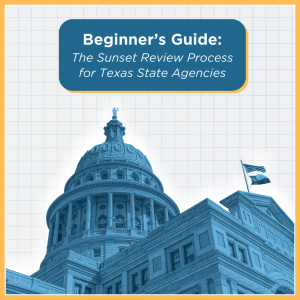
Although the Texas Legislature won’t reconvene for its next regular session until January 2025, decision-makers are already considering issues that could impact Texans for years to come. One key topic over the next 18 months is the state’s decision whether to continue (and fund) key justice-related agencies as part of its “Sunset” review process. In today’s Beginner’s Guide, we’ll share what Sunset is, why it’s important, and how you can use your voice to make a difference!
What is Sunset? In Texas, the Sunset review process determines whether certain state agencies will be authorized to continue or be shut down (“sunsetted”). The agencies that are subject to this process are reviewed in cycles, starting with an evaluation led by the Sunset Advisory Commission. The Commission includes a 12-person board comprised of 10 state lawmakers and 2 members of the public, along with a staff of about 30 people.
On its website, the Commission explains its work as follows: “The Commission questions the need for each agency, looks for potential duplication of other public services or programs, and considers new and innovative changes to improve each agency’s operations and activities. The Commission seeks public input on every agency under Sunset review and recommends actions on each agency to the full Legislature. In most cases, agencies under Sunset review are automatically abolished unless legislation is enacted to continue them.”
How does the Sunset process work? The Sunset Advisory Commission’s staff reviews self-evaluation reports submitted by state agencies (containing challenges, opportunities, and issues to be addressed), along with feedback from stakeholders – including advocacy organizations like TCJE, the public, agency staff, and other groups. This phase is happening now, and you can already submit public comments here. Next, the Sunset staff publishes a report with recommendations for each reviewed agency, to be considered by the full Sunset Advisory Commission. The Commission holds a public hearing that includes community testimony and responses from the agency itself. Based on that hearing, the Commission can update or add to the Sunset staff recommendations; then, it votes on each of the recommendations. The Sunset staff will update its original report to include the Commission’s final decisions.
Once the legislative session begins, lawmakers evaluate the agencies through Sunset bills. These bills follow the regular process, meaning each bill has to pass through committees and multiple readings in both the House and Senate (for more on how a bill becomes a law in Texas, check out one of our previous blog posts in this series!) Committee hearings on Sunset bills provide another opportunity for the public to participate in this process.
As a general rule, the Legislature must pass funding for an agency in order for that agency to continue functioning. At the end of the session where an agency is being reviewed, that agency will likely receive funding for the future with changes scheduled to take effect, or it will be abolished with time to wrap up functions or transfer them to another agency. Sunset bills may also change the amount of time scheduled before the agency receives its next review.
Which agencies are up for Sunset review in 2025? Given our excitement around Sunset, you likely won’t be surprised to see the list of agencies that will be up for review in the next session!
The list includes the Texas Department of Criminal Justice (TDCJ, the state prison system), the Texas Board of Pardons and Paroles (BPP, which determines releases from prison and parole processes), the Correctional Managed Health Care Committee (which manages medical care for incarcerated Texans), and Windham School District (WSD, which handles education in state prisons).
Together, these agencies have a massive impact on both the everyday lives and overall well-being of incarcerated Texans and their family members. It’s critical for impacted people to have a voice in determining their future.
How can Texans get involved? As outlined above, there are a few different opportunities for members of the public to share their thoughts with decision-makers during the Sunset process:
-
Submit public comments via this form (already open for the 2025 legislative session!): https://www.sunset.texas.gov/input-form
-
Testify at public hearings for each agency. The dates for these hearings haven’t been announced yet, so we recommend joining the Sunset Advisory Commission’s mailing list: https://www.sunset.texas.gov/join-mailing-list
-
During the legislative session, testify on specific Sunset bills in committee. Members of the public can sign up to testify at the State Capitol in Austin. Once session begins next January, we’ll be sending updates via our email list to keep you informed. Sign up here: https://www.texascje.org/sign-receive-our-emails. It’s also helpful to familiarize yourself with Texas Legislature Online (TLO, the Legislature’s website), where you can set personalized alerts for different committees and bills once the session starts: https://capitol.texas.gov/
Over the next year, the TCJE team and advocates at our partner organizations will continue sharing information about the Sunset review process, including opportunities for community members to weigh in. For a more thorough explanation of how Sunset works, including a walkthrough of the Sunset Advisory Commission's website, check out this video from TCJE's Justin Martinez!
As always, we hope this Beginner’s Guide helps remove some of the mystery that surrounds the legislative process! If you want to stay in the loop about Sunset, subscribe to our email list at the link above, or follow TCJE on Facebook, Instagram, Twitter/X, LinkedIn, or TikTok.
